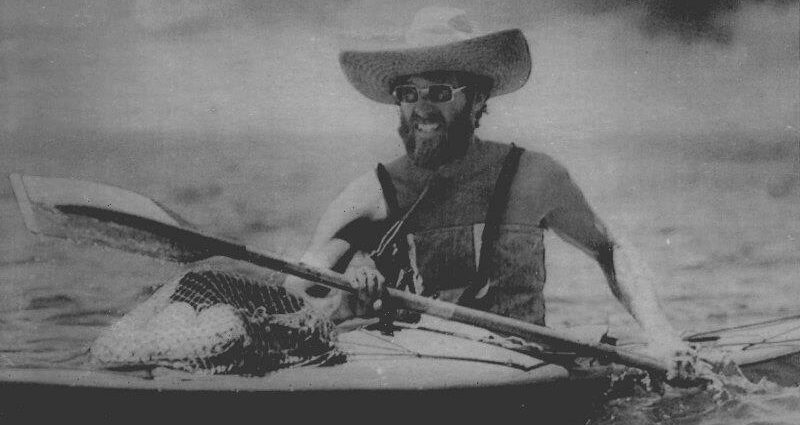First published in The Age on December 20, 1982
A weary paddler nears the end of his struggle
An Aboriginal community in Arnhem Land closed the local school and went to the beach to greet Paul Caffyn, 35, at the halfway mark of his attempt to circumnavigate Australia alone by kayak.
There was no such welcome when he paddled into Warrnambool at the weekend, within days of completing the journey he started in Melbourne on 28 December last year.
Paul Caffyn nears the end of his epic journey.
Salt water and rip tides have torn at his skin, a giant turtle which he mistook for a crocodile had invaded his tent, he has been threatened by sharks and guided by abalone and cray fishermen.
In a voyage covering more than 15,000 kilometres of some of the world’s most isolated and treacherous waters, he has averaged more than 50 kilometres a day. In one stretch down the south-west coat of Western Australia, Mr Caffyn paddled for 34 hours without break.
Yesterday in Warrnambool he said he had spent a lot of time singing, learning poetry and squaring numbers in his head to keep his mind alert.
“When the sea is cutting you up like it was yesterday it requires intensive concentration on what the sea and wind are doing,” he said. “But on the good days. I need things to keep my mind occupied.”
Mr Caffyn, an experienced geologist, teacher, mountaineer and photographer, plans to return to Runanga, New Zealand, to work on his home and two books about this and previous expeditions when he finishes in Melbourne this week. He completed the first circumnavigation of New Zealand’s South Island in 1978 and Great Britain in 1980. The journey around Australia would be his last big trip, he said.
Only once has he considered backing out of this expedition. When he saw the Zuytdorp cliffs, between Shark Bay and Kalbarri, north of Geraldton on Australia’s west coast, he wanted to go home.
“It is the worst bit of sea anywhere around Australia. I saw 15-metre cray boats at times hauled out of the water by the waves. In that area seas break as high as 20 metres up the cliff face.”
He said he considered he had three options at the time. “I could pack up and go home because I felt sick in the stomach – I could go down to Kalbarri and paddle the stretch north with the winds in my favour, or just keep going. I had to go out and have a go.
“There was a land fog and it was 34 hours with the compass before I limped into Kalbarri. I was a bit unsteady on my feet but quite relieved it was over.”
When he paddled out of Kalbarri two days later a Scotsman stood on the cliffs and piped him out to sea.
A back-up party of Lesley Hadley and Andy Woods, both New Zealanders, cook and navigate, drive a support vehicle and take photographs for a book they hope to publish. They are all deeply tanned and wiry.
Mr Caffyn said he spent four months on his own this year negotiating Australia’s far north where vehicle access was impossible.
“One night I was asleep in my two-man tent near the water line up in the top end. It was 1am and I felt the tent shaking and a jolt in my hips. A big set of tracks led to the tent and I thought it was a crocodile. I leapt out clear of the tent and it turned out it was a huge turtle.”
Mr Woods explained they all thought later that the incident was provoked by an amorous turtle who liked the dome-shaped tent.
Mr Caffyn was probably more frightened by the whale that swam within 15 metres off Canal Rocks near Cape Naturaliste, WA. “Lesley was standing on the rocks waving and shouting and I thought she was just invigorated by the morning air. It turns out she was trying to attract my attention to the huge whale in the water.”
Mr Caffyn has financed the trip with only one sponsor, a New Zealand sleeping bag manufacturer. He said he was disappointed that television focused on record-breaking and blood sports. “Most Aussies knock the trip and say I’m daft,” he said.
“Usually it’s the older people who have more respect for physical challenges. They know what it is to strive for something,”
Film makers in Australia and New Zealand were not interested, in recording the expedition. One US company made an offer but said if Mr Caffyn had not seen a crocodile by the time he reached Darwin they would rent one.
Mr Caffyn was not interested in any fake adventure – real life was bad enough.
Most Viewed in National
From our partners
Source: Read Full Article
-
19 great Nelson Mandela quotes that helped change the world
-
Wife of jailed Italian jeweller says they face financial ruin
-
Three chilling ways monster cop Wayne Couzens exposed his guilt after raping and murdering Sarah Everard | The Sun
-
Lone Russian soldier filmed begging for mercy after his squadron is wiped out
-
Police hunting Champagne-swilling suspect who nicked £1,000 of bubbly


